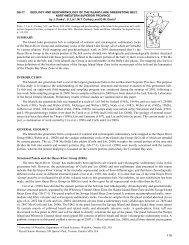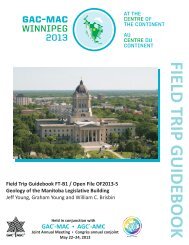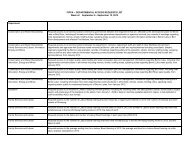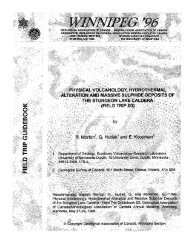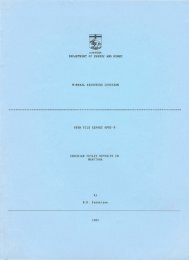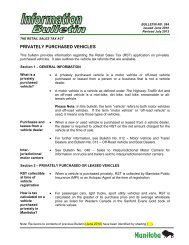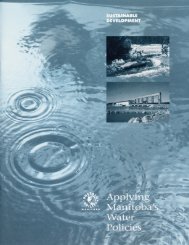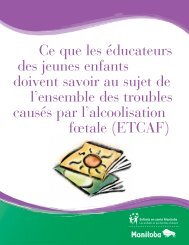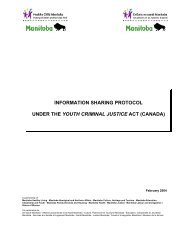Tenant
Tenant
Tenant
- No tags were found...
You also want an ePaper? Increase the reach of your titles
YUMPU automatically turns print PDFs into web optimized ePapers that Google loves.
Smoking.............................................................. 22Electrical............................................................. 22Heating................................................................ 23Candles............................................................... 23Basements........................................................... 23Kitchens.............................................................. 23What to do if a cooking fire starts................................ 24Around children and pets............................................ 24Smoke detectors....................................................... 25Barbeques (BBQ)........................................................ 26Open and Closed Fire Pits........................................... 26Pest Control.................................................................. 27Reporting pests to Manitoba Housing........................... 27Preventing and exterminating pests............................. 27Bed Bugs........................................................... . 28Ants.................................................................... 29Cockroaches........................................................ 30Bees, Wasps, Hornets........................................... 31House and deer mice............................................ 32Mold Prevention............................................................ 34How do you check for mold in your home..................... 34Prevent Mold in your Home......................................... 35General Interior.................................................... 35Bathrooms........................................................... 36Kitchens.............................................................. 37Closets and Bedrooms.......................................... 37Basements........................................................... 38Furnaces............................................................. 38Laundry............................................................... 38General exterior......................................................... 38Eliminating Mold......................................................... 39When you move out...................................................... 40Abandoned goods or property..................................... 41When a <strong>Tenant</strong> Breaks Their Rental Agreement.......... 43Winnipeg Offices........................................................... 44Rural Offices................................................................. 45Manitoba Housing Contact Information........................ 46Hours........................................................................ 46Important Phone numbers........................................... 46
Welcome…This handbook outlines information about:• your rights and your responsibilities• the rights and responsibilities of your landlord,Manitoba Housing• information for your health, safety and securityResidential Tenancy AgreementRead your Residential Tenancy Agreement carefully before you signit to make sure you understand your rights and responsibilities as atenant as well as your landlord’s rights and responsibilities.As a Manitoba Housing tenant, you areresponsible for:• paying your rent on time• paying your utility bills, if utilities are notincluded in the rent• notifying Manitoba Housing of any decreaseor increase in your income• informing Manitoba Housing aboutany change in the number of peopleliving in your home• keeping your home safe for alloccupants and visitors• ensuring your home is clean andfree of damage• helping keep common areastidy and free of debris1
• repairing, to an acceptable standard, any damagescaused by you or visitors to your home, as soon aspossible (The landlord may give you a written requestto make these repairs.)• complying with the terms of your tenancy agreement,and The Residential Tenancies Act (available atwww.manitoba.ca/housing)• complying with Manitoba Housing’s rules andregulations, as attached to your lease agreement. Pleasesee staff at your Manitoba Housing leasing office forinformation about your tenancy• ensuring you and your guests don’t disturb others orendanger the safety of others in the building or on aneighbouring propertyIf you do not meet these responsibilities, you may be asked toleave. (See page 43, for more information.)As your landlord, Manitoba Housing isresponsible for2• repairing your home within a reasonable time• ensuring your home is reasonably safe by having properdoors and locks• ensuring your home is available on the day your tenancy isto begin• providing a rent receipt when you pay your rent in cash• paying your utility bills, if utilities are included in the rent• investigating any complaints about a tenant disturbing othertenants or neighbours and trying to resolve the problem• respecting your tenancy agreement and The ResidentialTenancies Act• providing at least 24 hours notice before entering your unitto do repairs
Unit inspection reportBefore you move into a Manitoba Housing property, staffwill inspect your unit with you. Staff will fill in a standardreport form and note the condition of your home and anyrepairs that are required. Manitoba Housing will use thisreport to inspect your home when you leave. You will be heldresponsible for any damages beyond normal wear and tear.Paying your rentAll new Manitoba Housing tenants will be given a tenantidentification card when signing their lease agreements. Eachcard will include a personal application number that mustbe used when you pay your rent or visit a Manitoba Housingleasing office to discuss your tenancy or any other issues.3
Monthly rental paymentsRental payments are to be paidto Manitoba Housing usingone of the following options:• Direct payment by phoneor Internet: Charges mayapply, so please check withyour financial institution.• Pre-authorized payment(PAP): Monthly rental payments can be automaticallywithdrawn from your bank account on the first business dayof the month. The bank or financial institution may chargea fee for this service. Manitoba Housing will charge a fee foreach returned PAP.• Post-dated cheques: You can send or deliver post-datedcheques to your Manitoba Housing leasing office.• Cheque or money order: You can pay your rent monthlyby cheque or money order. Write your Manitoba Housingpersonal application number (the one on your originalapplication) on the front of all cheques or money orders.Manitoba Housing will charge a fee for each returned cheque.• Debit card (Interac): You can make rental payments inperson using your Interac debit card at most ManitobaHousing leasing offices.• Cash: In Winnipeg, cash payments are accepted only at theManitoba Housing leasing office located 100-185 SmithStreet. Some rural Manitoba Housing leasing offices acceptcash payments; check with your local leasing office.Note: do not send cash by mail.4
Utilities• Water is included in your rent, so youdo not have to contact the local waterdepartment.• You must contact Manitoba Hydro whenyou move in to arrange for hydro and gasunless they are included in your rent.• Phone, cable and Internet access are notincluded in your rent.• If you are on Employment and Income Assistance (EIA),speak to your caseworker to see if EIA will pay your utilitiesor if you have to pay for them.<strong>Tenant</strong>s’ insuranceManitoba Housing is not responsible for your personalproperty. For your own protection, we strongly recommendyou buy tenants’ insurance. <strong>Tenant</strong>s’ insurance covers damagesto your personal property from fire, flood, theft and otherevents. Contact an insurance company or agent to find thebest coverage for your needs.Making changes to your homeIf you want to make changes to your home, you must senda written request to your Manitoba Housing leasing officefor approval. Changes may include: adding portable airconditioners or satellite dishes, wallpapering, painting,carpeting, installing grab bars or fencing. If you get permissionto make changes, you must return your home back to itsoriginal condition before you move out. If you do not getwritten permission to make changes, or if you move out anddo not return the unit to its original condition, you will beheld responsible for any related costs.5
Parking restrictionsThe following restrictions apply to all Manitoba Housingparking areas:• Storing vehicles that do not run in Manitoba Housingparking lots. Vehicles must be able to be moved foremergencies, snow removal or repairs.• Parking in visitor’s parking over night without reporting toonsite staff.• Parking in fire lanes or in front of garbage bins.• Parking in other tenant’s parking spots.• Using interior car warmers.• Performing major vehicle repairs such as removing engines,transmissions or rear-end assemblies, in parking areas.• Dumping oil or other automotive fluids in parking areas.• Damaging asphalt surfaces or electrical outlets.Failure to comply with any of these restrictions means yourvehicle will be towed at your own expense without notice oryou will have to pay for damages.Rental statement for income taxesIf you need a rental statement for your income tax, contactyour Manitoba Housing leasing office.Note: Revenue Canada allows only one tenant to claim this taxdeduction. To receive your rent receipt, you must have madeall rent payments.10
Rental adjustmentsIf there is a significant decrease in your income, you may beeligible for a rental adjustment. Contact your Manitoba Housingleasing office if you have any questions about eligibility.Be sure to apply for an adjustment for every monththat your income is reduced. If you are applying for anadjustment to your rent, you must submit all requireddocuments, including proof of all income that appliesto you.Required documents may include:• employment pay stubs• Employment Income Assistance (EIA)- budget letter orcheque stub• Employment Insurance (EI) – letter or cheque stub• Canada Pension Plan – letter from Service Canada• Old Age Security – letter from Service Canada• interest/investment income• RRSP income• rental income• farm income• 55 Plus – letter or bankbook• private pension – letter or cheque stub or letter fromcompany• letter from Department of Veterans Affairs, cheque stub oryour bankbook• training allowances – letter from sponsor agency(s)11
• compensation/disability – award letter or cheque stub• child support/alimony – letter from MaintenanceEnforcement Program, or a copy of the order or agreement• self-employment – income and expense statement bycertified accountant• manitoba student loans – confirmation letter of Award• children 16 and over, not in school – letter from employeror cheque stub• children 16 and over, in school – written verification ofattendance/registration from schoolLease renewalsLease renewals are completed annually. Four monthsbefore the lock-in term of the standard Residential TenancyAgreement expires, your circumstances will be reviewed todetermine if :• the rental charge will change. You will receive three months’written notice of any rent increase, as per The ResidentialTenancies Act• your unit size is appropriate based on the size of yourhouseholdFor annual renewals be sure to submit all requireddocuments to ensure your tenancy is maintained.The documents that may be required for an annual renewal arethe same as those required for a rent reduction (see page 11)with one exception.In an annual renewal you will also need to submit:• certified copy of your most recent income tax return12
<strong>Tenant</strong> ServicesInformation on health and social servicesManitoba Housing leasing offices may be able to help you getinformation about health and social services. Staff can help youwith independent living in the community as long as possible by:• Providing information about health, social services andcommunity programs and services• Supporting tenant groups, such as tenant associations andtenant advisory committees• Providing information on education and training programs• Supporting community programs and resource centres• Referring tenants to appropriate support service providersand/or agencies• Working with tenant groups and other agencies to coordinatevarious onsite support services such as:• Income tax clinics• Health clinics• Community senior services• Health fairs• Income assistance programs• Recreation/leisure programs• Food banks• Community mental health services where relevant• Programs for parenting children and youth13
Seniors’ support servicesCheck with your Manitoba Housing leasing office to see whatservices may be available in your building to help seniors liveindependently:• Security systems• Congregate meal programs• Elevator service• <strong>Tenant</strong> associations or tenant advisory committees• Laundry facilities• Supportive housing• Recreation areas• Health clinics• Provincial home care• Transportation servicesCongregate meal service is offered in seniors communitiesthroughout the province.• Fresh, hot meals including beverage and dessert, are servedfor a reasonable cost• Meal menus are posted every month14
The BUILDINGFoundationsBursary ProgramManitoba Housing understands the vital role education plays inimproving the quality of lives. That’s why Manitoba Housing’sbursary fund provides nine $1,000 bursaries to post-secondarystudents living in subsidized rental housing units in Manitoba orreceiving a rental subsidy funded by Manitoba Housing. Bursariesare awarded based on academic achievement and communityparticipation. Mature students are encouraged to apply.Bursary for Post-Secondary Students:A $1,000 bursary is available to eight post-secondary studentsstudying in a Manitoba university or college post-secondaryprogram at least one academic year in length.At least four of these bursaries two university and two collegewill be allocated to students of North American Aboriginalancestry, either Métis, Inuit, Status Indian or Non-status Indian.Bursary for Graduate Students:A $1000 bursary is available for a graduatestudent studying at a Manitoba university.The graduate student may be offereda summer internship with ManitobaHousing where a position existssuitable to the applicant’s field ofstudy.16For more information on theBUILDINGFoundations BursaryProgram go to our website atwww.manitoba.ca/housing orask your local Manitoba Housingleasing office.
Safety and SecuritySafety and security toolsManitoba Housing has electronic security surveillance andsecurity controls, tenant safety seminars and communitysafety tools, such as The Safer Communities andNeighbourhood Act to help promote safe, healthy communities.Manitoba Housing works with tenants, tenant associations,committees and other groups and agencies to promotea positive presence in our communities. All ManitobaHousing employees carry photo identification cards. Ifanyone claiming to be a Manitoba Housing employee asksyou to let them in your building or in your suite, ask themto show you their photo ID.For more information contact Manitoba Housing at 945-4663in Winnipeg; 1-800-661-4663 toll free; or visit your ManitobaHousing leasing office.What can you do to help?Call 911 or your local emergency services throughoutthe province for any of the following matters:• any disturbanceinvolving violence ofany kind• illegal drug use,drug dealing, drugproduction or cultivation• prostitution and relatedactivities• unlawful sale of liquor• unlawful use or sale ofintoxicating substances• sexual abuse orexploitation of a child orrelated activities• possession or storageof an unlawful firearm,weapon or explosive• a break-in17
After you call the police, please call Manitoba Housing at945-4663 in Winnipeg; or 1-800-661-4663 toll free, 24 hours aday, seven days a week.You can also contact Manitoba Housing for less urgent mattersincluding:• Noise or disturbances in your building or on your property.• Any unauthorized or suspicious people loitering aroundyour building or home.18
Fire SafetyEveryone is responsible for keeping Manitoba Housinghomes and properties safe from fire. Call 911 or yourlocal emergency services if:• You see a fire being started or one is startedanywhere in your home, property or community.• You see a building that has smoke or fire.• You are in a building where there is smoke or fire.Call Manitoba Housing at 945-4663 in Winnipeg; or toll free1-800-661-4663 to report:• suspicious people or activities that have the potential tostart a fire• any build up of garbage or other materials that could be afire hazard• any shrubs, snow or other materials that may be blockingfire safety equipment• baseboard heaters, thermostats or furnaces that aren’t working• faulty wiring or broken cover plates• a broken smoke detector19
If your clothing catches fire:1. Stop, drop and roll. Drop to the ground, cover yourface with your hands and roll until the fire goes out.2. If you can’t do this, grab a towel or blanket andsmother the flames.Fire safety seminarsManitoba Housing works with tenants, tenant associations,tenant advisory committees and other groups to promotefire safety in our communities by conducting fire safetyseminars. To arrange a seminar for your building, property orcommunity, call your Manitoba Housing leasing office.Fire safety plansManitoba Housing has fire safety plans for buildings that havea common area and for high-rise/low-rise buildings.• The printed plans are posted near the elevators and in thelobbies of the buildings.• If you don’t live in a unit where you have a shared commonarea, then you must develop a fire safety plan for yourself.• You should develop a fire safety plan with your entirefamily. Draw your plan to include two ways out of everyroom including the windows. Pick a meeting place outsideand well away fromthe building.21
Fire Prevention TipsManitoba Housing needs your help to prevent fires in your home,buildings and community. Here are tips for you to follow:Smoking• Never smoke in bed.• Avoid careless smoking. Always use proper ashtrays thatdon’t tip.• Dispose of smoking materials such as cigarette butts and thecontents of ashtrays with caution.• Never empty ashtrays into combustible containers such asgarbage cans or refuse containers.Electrical• Never overload electrical circuits.• Ensure all extension cords and electrical devices are in goodcondition. Check regularly for loose connections and frayedor exposed wire and discard defective cords.• Insert plugs fully into outlets. Poor contact may causeoverheating or electrical shock.• To avoid overheating, do not coil or bunch an extensioncord while in use.• Never use extension cords under carpets or rugs, acrossdoorways or any place where they will be stepped on orrubbed.• Make sure you follow the recommended wattage notedon your light fixtures. Do not use bulbs that exceed theamount.• Use light bulb protectors with older style halogen lights.22
Heating• Keep clothing, boxes, bags, papers and other flammablematerials away from furnaces, baseboard heaters, space heaters.• Keep space heaters away from walls.Candles• Place all candles in sturdy holders that won’t burn orallow wax to drip onto tables, floors or rugs.• Extinguish all candles before you leave the room.• Keep a careful eye on children and pets when candles are lit.Basements• Store flammable materials in the original containers orapproved safety containers.• Keep entrances clear.• Remove lint from dryers after each load.• Do not place plastic or rubber items in the dryer.• Do not place items that have been exposed to chemicals inthe dryer.Kitchens• Keep a portable fire extinguisher in the kitchen.• Be careful that grease doesn’t splatter or spill when cooking.• Do not use tin foil or any other metal substance in themicrowave.• Wipe appliances and surfaces after cooking to preventgrease buildup.• Stay in the kitchen when cooking. Do not leave the roomunless absolutely necessary.• Never leave your home while food is on the stove, in theoven or microwave.23
• Keep the stove and surrounding area clear. Dish towels,pot holders, curtains and aprons can catch fire easily, sokeep them away from the stove at all times.• Turn pot handles towards the centre of the stove.• Never wear loose clothing while cooking.• Always heat oil slowly over moderate heat.• Turn off all stove and oven elements and unplug smallappliances when not in use.• Keep all heat-producing appliances away from the walland away from anything that might burn.What to do if a cooking fire starts• If a pot or pan catches fire, carefully slide a lid over thepot or pan and turn off the stove. Leave the lid on untilthe pot or pan is completely cool.• If there is a fire in the oven or microwave, keep the door shut.• Never throw water on a grease fire. Water will cause greasefires to spread.Around children and pets• Keep children and pets away from fires, candles, stoves,fireplaces and flammable materials.• Do not store cookies, cereal, or other treats for smallchildren near the stove.• Keep young children at least one metre (three feet) awayfrom the stove while older family members are cooking.• Older children should cook only with permission and underthe supervision of a grown-up.• Cover unused wall outlets with safety caps.• Keep matches and lighters out of children’s reach, preferablyin a locked cabinet. Use only child resistant lighters.24
Barbeques (BBQ)• BBQs are only allowed on balconies, patios or decks that arenot made of wood.• BBQs that use a solid fuel such as wood or charcoalbriquettes are not allowed.• BBQs that use electricity, propane or natural gas as a fuelsource are allowed.You are responsible for your BBQ and must ensure that it is:• operated only outdoors in a well-ventilated area• not operated within an enclosed area or near combustiblematerials• used under constant adult supervisionThe propane tank used for your BBQ must:• be kept upright at all times• be closed at the valve when stored in a vehicle, building orbelow ground level• not be stored within two metres (6.5 feet) of a portable BBQwhen not attached to the BBQ• not be stored on a balcony that is enclosed by a screen or glass• not be more than 20 pounds when attached to the BBQ• not have a valve closer than 900 millimetres (three feet)fromany door or window that is lower than the valve• be equipped with a quick connect coupling valve (Q.C.C.V)and an overfill protection device (O.P.D.)Open and Closed Fire PitsOpen and closed fire pits are not allowed on ManitobaHousing properties.26
Pest ControlManitoba Housing has a pest control team that maintainsa healthy, safe environment for you and your guests. Thisincludes getting rid of any pests that appear in your homeand helping you avoid pests.Report pests to your Manitoba Housingleasing office• If you think you have pests in your home, phoneManitoba Housing immediately at 945-4663 inWinnipeg; or toll free 1-800-661-4663.• To avoid causing any further infestations, ManitobaHousing does not recommend that you treat pestproblems on your own.Preventing and exterminating pests• Manitoba Housing can provide you with information onhow to identify and prevent pests in your home. ManitobaHousing also arranges information sessions on how tomaintain a pest-free home.• An appointment with a professional exterminator will bescheduled to exterminate any pests in your home. Yourbelongings will be respected while your home is treated.With your co-operation, any pest concerns can be treatedwithout complications.• Manitoba Housing will provide you with information aboutwhat is needed to prepare in advance for the exterminatorand what the treatment and follow-up will involve.27
Bed bugsLook for these signs:• Itchy red welts on your skin. Thesewelts can be many sizes and canappear in groups of two or three.• Dark red or brown stains on furniture, bed sheets and clothing.Where do you find bed bugs?Some of their favourite hiding places are:• Behind baseboards• Under loose carpetsand rugs• Inside couches/sofas,mattresses, box springsand bed frames• In furniture andluggage28How do I stop bedbugs from getting into my home or coming back?• Check furniture and other household items regularly.• Maintain your home and keep up with the cleaning.• Keep your home free of clutter and avoid keeping clothing,toys and other household items on the floor.• Regularly wash all bedding and clothing in HOT water and/or dry them in a HOT dryer (high heat – 40°C /120°F) for aminimum of 20 minutes.• Vacuum all mattresses and mattress frames. Remove the bagfrom the vacuum cleaner immediately after vacuuming,seal it and throw it in the outside garbage.
• Consider having a bed bug-proofmattress cover installed. Upon request,Manitoba Housing will provide thesemattress covers at no charge.• Watch for bed bugs hiding in cracks,creases, folds, seams and tears.• Watch for dark red or brown stains onbed sheets, clothing and mattresses/box springs, especially around the edgesand around the seams.• Look closely at any second-hand furniture,suitcases or clothing beforebringing them into your home.• Vacuum or shake out suitcases beforebringing them into your home.AntsLook for these signs:• If you only see a few ants(less than 10), it usuallymeans there isn’t anestablished colony.• If you have carpenter antsin the wood in your home,the wood will often showdamage – small bore holes.Where do you findants?• Ants are drawn to areasthat are constantly moist.29
• Ants may crawl acrosssidewalks, driveways andbasement floors.How do I stop ants fromgetting into my home or coming back?• Thoroughly clean your home regularly,wiping up any sticky spills immediately.• Keep food stored in sealed containers.• Remove any old and untreated wood,especially if it has visible bore holes.• Report any ongoing moisture problemsin your home to Manitoba Housing assoon as possible.CockroachesLook for these signs:• New cockroaches outgrow their shells, discard them andgrow new ones. The old shells can be seen in the areas thepests are drawn to.• You see cockroaches at night when the light is turned out.They scurry for cover when the light is turned on.Where do you find cockroaches?• They are drawn to warm, humid areas, such as basements,kitchens, bathrooms, sewer pipes, gardens, greenhouses,damp pavement and walkways.• They easily adapt to new surrounding and will surviveon almost any source of moisture and food. They feedon human food, garbage, fruit, crumbs and a variety of30
other items including wood, leather, glue, cigarette butts,toothpaste and soap.How do I stop cockroaches from getting into myhome or coming back?• Give your home a thorough cleaning regularly, getting ridof any crumbs and food particles on counters and floors.• Carefully inspect any used furniture, appliances or clothingyou bring into your home.• Check around cracked plumbing fixtures and floor drainsfor signs of cockroachs.• Report any ongoing moisture problems in your home toManitoba Housing as soon as possible.Bees, wasps, hornetsLook for these signs:• Wasps and hornets nests are large, grayish, papery conesand are usually found in protected cavities such as in woodpiles, under eaves, protected limbs of trees and chimneys.• Bee hives are large, brownish, lumpy cones and can befound almost anywhere.Where do you findbees, wasps andhornets?• These insects aremost commonly31
found outside, but they can invade homes, building nests inprotected areas such as chimneys and under eaves.How do I stop bees, wasps and hornets fromgetting into my home or coming back?• These insects are all attracted to sweet foods,decaying materials and other insects, so sealor eliminate any food source.• Pollen and nectar are the main sources offood for bees, but they are also drawn tosweet, sticky food spills or food left out onplates.House and deer mice• House mice are grey rodents (with large ears and small eyes)that measure 2.5 to 3.5 inches (6.5 to nine centimetres). Thetail is usually the same length as the body.• Deer mice are grey to reddish brown rodents with two-tonetails and white undersides. They measure 2.8 to 3.9 inches(seven to 10 centimetres).Look for these signs:• Small droppings near food sources, gnawed holes in bagsand boxes containing food or garbage.• Listen for noises made by their running, gnawing andscratching to locate them in your home – especially duringthe evening and night when they are most active. If food isscarce, they will also be active during daylight hours.Where do you find mice?32
• Mice can survive outdoors in winter, but are drawn tobuildings for protection and easier food sources.• You can often hear mice because they build nests close tofood, usually in between double walls, above ceilings, underfloors and closed in areas around counters.How do I stop mice from getting into my homeor coming back?• Give your home a thorough cleaning regularly; removecrumbs and food particles.• Store all garbage in containers with tight lids.• Store food in sealed jars or tins as mice can often chewthrough plastic.• Contact Manitoba Housing if you notice any cracks orcrevices open to the outside of your home (eg: unsealeddryer vents, exterior water/gas hook-ups, etc.).• Keep the grass around your home well cut and removedense shrubbery that’s less than three feet (one metre) fromyour home.Is there a risk of getting sick from mice?• Mice (particularly deer mice) can carry the Hantaviruswhich can cause serious illness.• Although reported cases are relatively rare, typical symptomsare flu-like and include fever, headache, nausea, vomiting,muscle aches, diarrhea, abdominal pain and shortness ofbreath. Symptoms can occur any time between three days tosix weeks (usually occurring around 14 days) after exposure.Hantavirus infection without symptoms is rare.• For more information on prevention, go to: manitoba.ca33
Mold preventionMold can be a health issue for you and your family and it can alsocause damage to your home. Manitoba Housing has an ongoingprogram to help you prevent mold in your home including:• Annual inspections of all units and common areas ofbuildings for mold.• Renovation of Manitoba Housing properties to ensureadequate air intake and circulation.• Repair and replacement of roofs, windows and the outershells of buildings.• Free information session on preventing and dealing with mold.How do you check for mold in your home?• Smell. Mold generally has a musty, damp smell that isunpleasant and reduces the air quality.• Visible growth. Mold and mildew can grow in a varietyof patterns and colors. The most common are black,grey-brown, grey-green, orange or purple. Black mold isgenerally a greenish black with a slimy appearance.• Physical symptoms. Some people are allergic to mold. Ifyou have an increase in allergy symptoms or are havingheadaches or feeling dizzy when you’re at home for anextended period, you may have mold in your home.34
Mold is most likely to be found in:• Kitchens and bathrooms where exhaust fans don’t workproperly.• Around leaking taps, pipes or toilets.• Anywhere there’s excess moisture created on a regular basis,for example in the kitchen or bathroom or a water leak.Call Manitoba Housing at 945-4663 in Winnipeg; or toll free1-800-661-4663 as soon as possible to report any of theseconditions.Prevent mold in your homeGeneral Interior• Keep your home well-ventilated and use the exhaust fansaround the stove and in the bathroom.• Remove any stored items you no longer use. Fabrics, paper,wood and other materials collect dust and hold moisturewhich can cause mold.• Manitoba Housing will service your heat recovery ventilatoron a regular basis.• Have family and guests remove their shoes when enteringyour home.35
• Vacuum often. If possible, use a high efficiency particulateair filter to remove dust.• Clean hardwood floors with a damp mop.• Remove unnecessary, dust-collecting furniture.• Avoid bringing in any furniture previously stored in amoldy place.• Reduce the number of house plants you have and inspectthe soil in the pots to make sure there is no mold on thesurface.• Keep furniture, boxes and clothing at least two inches awayfrom the exterior wall to ensure adequate air movement.Bathrooms• Run the bathroom fan while you shower and for a fewminutes afterward.• Keep shower times as short as possible.• Keep all surfaces clean and dry. Wipe up any standing wateron the floor and around the bathroom sink/vanity.36
Eliminating mold• Mold patches that cover less than two or three square feet(0.5 to one metre) are considered small, so you can usuallyclean the mold yourself.• Always wear rubber gloves, safety glasses, a dust mask and along-sleeved shirt when working around mold.• If you find mold on a washable surface, scrub the area withsoapy water, rinse with a clean damp cloth and then dryquickly.• Clean moldy drywall with a damp cloth and baking soda ordetergent. Do not allow the drywall to get too wet.Note: For larger areas, or if you have recurring mold,call the Manitoba Housing leasing office at 945-4663 inWinnipeg; 1-800-661-4663, toll free.39
When you move outWhen you are ready to move out, contact your ManitobaHousing leasing office right away. You must give atleast one full calendar month’s notice when you areready to move.• Make sure you clean your unit and return it to the samecondition it was in when you took possession. Thecondition of your home will be verified by completing anoutgoing tenant inspection with Manitoba Housing.• Remove all personal property from the unit.• Please note: To avoid losing any personal property when youmove out, arrange to have all your property moved from thehousing unit, on or before, your moving day.• Return your keys and any security access cards the dayyou move or by the next business day. If these are notreturned, you will be charged for each card or key andyour rental account will show you have money owing toManitoba Housing.40
• Make sure that you do not owe any back rent. If you owerent when you leave, Manitoba Housing will file the accountwith the Canada Revenue Agency to collect money owed.This may be recovered from your income tax refund andGoods and Services Tax (GST) credit until the debt is paid.• Provide Manitoba Housing with a forwarding address, andmake sure you send change-of-address information to allyour important contacts before you move.• Cancel your account and your pre-authorized payments forall your utilities.Abandoned goods or property<strong>Tenant</strong>s must take all their personal property with them whenthey move out.• If you leave any personal property when you move out,Manitoba Housing will follow the Residential TenanciesBranch guidelines to dispose of it.• If you do not want your personal property, ManitobaHousing can provide an Authorization to Dispose ofContents form to be signed by you before you move out.The form gives Manitoba Housing permission to dispose ofpersonal property left behind.• Please note: You will be responsible for all costs involved indisposing of the abandoned goods.• If you need to leave something behind, contact ManitobaHousing immediately with your new contact informationand the date you will be picking the items up.41
When Manitoba Housing finds abandoned goods, we willmake reasonable efforts to contact you and give you a chanceto pick them up. Manitoba Housing will also make a list of theabandoned goods for you. If you cannot be reached:• The list will be sent to your last known address.• Your goods will be stored for 60 days, if the landlordbelieves the abandoned items are safe and sanitary forstorage, and that they have some cash value. Otherwise, theabandoned goods will immediately be given to charity ordiscarded.• Please note: <strong>Tenant</strong>s will be responsible for all costs involvedin storing abandoned goods.• If the abandoned goods are personal documents orphotographs, they will be stored by Manitoba Housing for60 days, regardless of their cash value.• If you do not claim the abandoned goods within 60 days,Manitoba Housing will contact the Residential TenanciesBranch to determine if the goods can be sold or discarded.• Manitoba Housing will record all information about yourabandoned goods, including photographs of the goods andan Authorization to Dispose of Contents form.42
When a tenant breaks theirrental agreement<strong>Tenant</strong>s are expected to pay rent in full on or before the first dayof each month. When a tenant is more than three days late payingthe rent, a Notice of Termination may be issued to the tenant tomove out.If a tenant doesn’t move or pay their rent, the ResidentialTenancies Branch may be asked to order the tenant to move. Thisis called an Application for an Order of Possession.Some other reasons that Manitoba Housing may issue aNotice of Termination to a tenant:• a tenant or their guests risk the safety of others• prevents other tenants from feeling safe in their homes• a tenant or their guests damage the home or property• a tenant or their guests disturb others in the building ornearby property• changes locks or doors to a residential unit or complex• fails to keep the home clean• allows overcrowding• has pets in the home without permission• interferes with the landlord’s duties to keep the tenant’shome safe and pest-freeFor more information, contact the Residential TenanciesBranch or visit: www.manitoba.ca/rtb43
Winnipeg Offices:Brooklands312 Blake St.Winnipeg, MB R3E 2Z4Phone: 945-5570Central Park355 Kennedy St.Winnipeg, MB R3B 3B8Phone: 945-6272Downtown South100-185 Smith St.Winnipeg, MB R3C 3G4Phone: 945-3884Gilbert Park1-71 Gilbert Ave.Winnipeg, MB R2X 0T4Phone: 945-1078Lord Selkirk269 Dufferin Ave.Winnipeg, MB R2W 2X8Phone: 945-3431North End400A Logan Ave.Winnipeg, MB R3A 0R1Phone: 945-7823St. Boniface(Located in the St Boniface BilingualServices Centre)614 Rue Des MeuronsWinnipeg, MB R2H 2P9Phone: 945-2113St. James15-659 Cavalier Dr.Winnipeg, MB R2Y 1Y1Phone: 945-4758St. VitalUnit D-1026St. Mary’s Rd.Winnipeg, MB R2M 3S6Phone: 945-4899North East600 Panet Rd.Winnipeg, MB R2L 2B1Phone: 945-355544
Rural Offices:AltonaP.O. Box 157067 2nd St. NEAltona, MB R0G 0B0Phone: 204-324-5308Toll Free: 1-800-480-5554Brandon253-9th St.Brandon, MB R7A 6X1Phone: 204-726-6455Toll Free: 1-800-651-8217ChurchillP.O. Box 448,31 Hudson Sq.Churchill, MB R0B 0E0Phone: 204-675-8838DauphinRoom 120,27-2nd Ave. SWDauphin, MB R7N 3E5Phone: 204-622-2092Toll Free: 1-866-950-9925GimliP.O. Box 1680,122-5th Ave.Gimli, MB R0C 1B0Phone: 204-642-6060Toll Free: 1-888-642-6066Notre Damede Lourdes(Located in theMountain Region Bilingual ServiceCentre).51-55 Rodgers St.Notre Dame de Lourdes, MBR0G 1M0Phone: 204-248-7270Toll Free: 1-866-267-6114Portage la PrairieB18-25 Tupper St. NPortage la Prairie, MBR1N 3K1Phone: 204-239-3680Toll Free: 1-866-440-4663RoblinP.O. Box 1028,117-2nd Ave NWRoblin, MB R0L 1P0Phone: 204-937-6474Toll Free: 1-888-567-8125Selkirk102-235 Eaton Ave.Selkirk, MB R1A 0W7Phone: 204-785-5228Toll Free: 1-800-441-5514St. Pierre Jolys(Located in theRed River Region Bilingual ServiceCentre)P.O. Box 98427 Sabourin St.St. Pierre Jolys, MB R0A 1V0Phone: 204-433-2578Toll Free: 1-866-563-2362Swan RiverP.O. Box 2501-514 Main St.Swan River, MB R0L 1Z0Phone: 204-734-4297Toll Free: 1-866-950-9924The PasP.O. Box 2550,214 Fischer Ave.The Pas, MB R9A 1M4Phone: 204-627-8355Toll Free: 1-800-778-431145
Manitoba Housing contact information:We’re here for you 24 hours a day, seven days a week.Manitoba Housing leasing office hours:Monday to Friday-8:30 a.m. to 4:30 p.m.Manitoba Housing staff can help you:• recover lost or stolen keys or security access cards• report pests in your unit or building• report nuisances or disturbances• arrange for repairs or maintenance in your unit or buildingImportant numbers and informationTo contact Manitoba Housing staff:• in Winnipeg – call 945-4663• outside Winnipeg – call 1-800-661-HOME (4663) toll free• visit our website at www.Manitoba.ca/housing• come to your local Manitoba Housing leasing office (See page 44and 45, for the location near you.)emergency numbers:Call 911 – orCheck your local phone book for the number in your area.46
Non-emergency NUMBERS:Call 311 – in Winnipeg orCheck your local phone book for the number in your area.Other important safety and securityinformation:Manitoba Justice administers The Safer Communities andNeighbourhood ActIf there are suspected criminal activities in your building, complex orneighbourhood, you can report it.Call 945-3475 – in WinnipegCall 1-800-954-9361 – outside of Winnipeg (toll free)Manitoba Crime Stoppers:If you see a crime in your building, complex or neighbourhood, you canhelp the police.Call 1-800-222-8477 (TIPS) (toll free)Or go to Crime Stoppers website at www.manitobacrimestoppers.comFor local utilities and telecommunicationsservices, contact:MTSCall 204-225-5687 – for all areasVisit the website at www.mts.caShawCall 1-888-472-2222 for all areasVisit the website at www.shaw.caManitoba Hydro:Call 480-5900 – in WinnipegCall 1-888-624-9376 – outside Winnipeg (toll free)Visit the website at www.hydro.mb.ca47
manitoba.ca/housingAugust 2010Cette information existe également en français.



